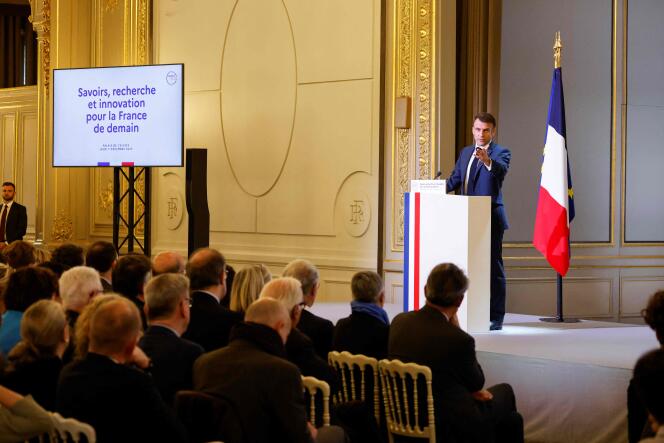


In front of a gathering of over 300 French researchers and scientific leaders at the Elysée Palace on Thursday, December 7, President Emmanuel Marcon presented his "vision for the future of French research," including the creation of a "Presidential Council for Science" and several other measures. Research and innovation have been at the heart of the president's agenda for the week: The day before, he had spoken to a dozen start-ups about future small satellite launchers and small nuclear reactors, and on Monday, he will visit Toulouse to meet recipients of funding from the France 2030 investment plan.
He reminded the audience on Thursday that science and research, which allow to "build growth," are "an essential issue of sovereignty." He spoke of the "strange defeat" of France's failure to produce a vaccine during the Covid-19 crisis, and referred to the "geopolitical competition" surrounding quantum technologies and artificial intelligence.
After observing that it had a successful year for French research, with the Nobel Prize in Physics awarded to Pierre Agostini and Anne L'Huillier, Macron shared what he called "quick and lucid assessment." He highlighted the "deteriorating" link between research and innovation, and the fact that the sector is still suffering the consequences of "chronic under-investment," which has driven the country from sixth to ninth place worldwide between 2009 and 2021, in scientific production rankings.
He also highlighted the measures taken since his first term in office, notably the 2020 law planning research spending, which provides for an additional investment of €25 billion over 10 years. He observed that France's public research effort, as a percentage of GDP, was on a par with the United States and the United Kingdom, but still behind Germany, but did not suggest making additional investments. "The heart of the difference," said Macron, remains the weakness of private investment in R&D. To finish, he criticized the bureaucracy, "a real waste of research time and public money."
To address these issues, Macron began by announcing the creation of a Presidential Council for Science. Made up of 12 members of the scientific community from different backgrounds, it will meet "at least once every quarter" to exchange views with him, "alert him to dysfunctions," or point out new projects and themes.
The council represents a radical departure from the proposal made by geophysicist Philippe Gillet in a report submitted to the minister of research in June. Gillet had advocated for the appointment of a high-level science adviser to replace a dormant institution, the Strategic Council for Research, created in 2013. The new council will not define French strategy, nor will it issue public opinions. "It's by no means clear what it will do, but anything that can help bring science and society closer together is welcome," said computer scientist Claire Mathieu, a CNRS silver medalist and member of the future council. Sociologist Pierre-Paul Zalio, who was asked to take part last week, believes that the president wants to hear from different perspectives in a spirit of "freedom of speech."
You have 55% of this article left to read. The rest is for subscribers only.
